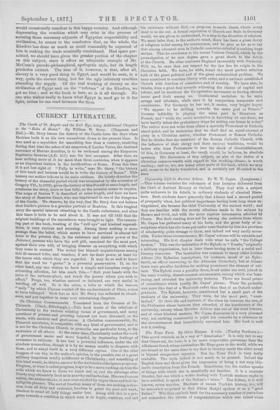University Life in Ancient Athens. By W. W. Capes. (Longmans.)
—This volume contains the substance of four lectures delivered from the Chair of Ancient History at Oxford. They deal with a subject quite unknown in its details to ordinary students of classical litera- ture. Such students know generally that Athens had a second period of prosperity when, her political importance having been long since ex- tinguished, she became the chief University of the ancient world ; and they are familiar with the scanty allusions made to the subject by Horace and Ovid, and with the more copious information afforded by Cicero. But their reading does not lie among the authors from whom Mr. Capes has gathered many of his facts, and the groat body of in- scriptions which has also been put under contribution by him is a province of scholarship quite strange to them, and indeed not very easily acces- sible. Under these circumstances, Mr. Capes' volume will be valuable and interesting. His first chapter deals with what he calls "the College System." This was the institution of the Ephebi or " Youths," originally a military organisation, but in later times having more of a social and literary character. The institution was common to many cities besides Athens (the Ephosian inscriptions, for instance, speak of an Ephe. barch, an officer answering to the Athenian Cosmates), but at Athens there were peculiar facilities for making prominent the element of cul- ture. The Ephobi wore a peculiar dress, lived under one roof, joined in the same worship, shared common amusements, among which was boat- racing, and attended the university lectures. There are broad points of resemblance which justify Mr. Capes' phrase. Their life probably was more like that of a Woolwich cadet than that of an Oxford under- graduate. The Ephobi, however, constituted but a small part of the students of the university. They wore, for the most part, " unat- tached." Of their life and (totems, of the close tie between the two, of the Professors whose lectures they attended, of the benefactors of the university, among whom Herodes Atticus was one of the most famous, and of other kindred matters, Mr. Capes discourses in a very pleasant way, not omitting occasionally to point his remarks by a referenceois wetlol
the circumstances that immediately surround him. Ilia b worth reading.






























 Previous page
Previous page